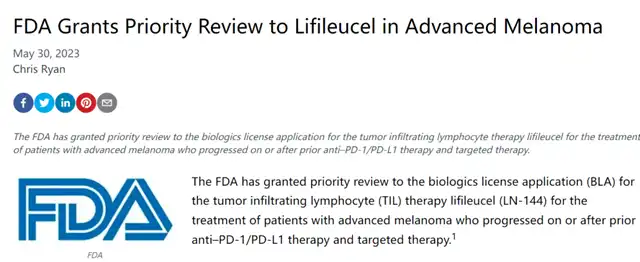Cancer Treatment: TIL Cell Therapy Shows Remarkable Efficacy
- Normal Liver Cells Found to Promote Cancer Metastasis to the Liver
- Nearly 80% Complete Remission: Breakthrough in ADC Anti-Tumor Treatment
- Vaccination Against Common Diseases May Prevent Dementia!
- New Alzheimer’s Disease (AD) Diagnosis and Staging Criteria
- Breakthrough in Alzheimer’s Disease: New Nasal Spray Halts Cognitive Decline by Targeting Toxic Protein
- Can the Tap Water at the Paris Olympics be Drunk Directly?
Breakthrough in Cancer Treatment: TIL Cell Therapy Shows Remarkable Efficacy
- Should China be held legally responsible for the US’s $18 trillion COVID losses?
- CT Radiation Exposure Linked to Blood Cancer in Children and Adolescents
- FDA has mandated a top-level black box warning for all marketed CAR-T therapies
- Can people with high blood pressure eat peanuts?
- What is the difference between dopamine and dobutamine?
- How long can the patient live after heart stent surgery?
Breakthrough in Cancer Treatment: TIL Cell Therapy Shows Remarkable Efficacy
Cell therapy, a burgeoning field in biotechnology, has gained momentum in recent years, with adoptive cell therapy (ACT) emerging as a promising strategy for cancer immunotherapy.
Specifically designed to target and destroy tumor cells, TIL (Tumor-Infiltrating Lymphocyte) cell therapy has demonstrated significant potential and is poised to become one of the most promising approved cell therapies.
I. Understanding Tumor-Infiltrating Lymphocytes (TIL)
In the early stages of cancer, the immune system mobilizes specialized immune cells, including TILs, to attack tumors. TILs, hidden within tumor lesions, are a valuable group of highly potent immune cells with strong anticancer abilities.
TIL therapy, a novel form of adoptive cell immunotherapy, involves collecting immune-active cells from a patient, expanding, genetically engineering, and functionally identifying them outside the body before reintroducing them to the patient. This process aims to directly kill tumor cells or stimulate the body’s immune response to target and eliminate cancer cells.
II. How TIL Cell Therapy Differs from Other Immunotherapies
TIL cell therapy isolates immune cells infiltrating tumor tissues, similar to CAR-T therapy. However, TILs, with their high proportion of tumor-specific T cells and diverse population, exhibit advantages such as multi-targeting, strong tumor tropism, infiltration capability, and minimal side effects compared to CAR-T and PD-1/PD-L1 antibody therapies.
III. Enhanced Recognition and Killing Power of TILs
TILs, originating from tumor tissues, possess natural targeting of patient-specific tumor antigens, giving them a superior ability to recognize cancer compared to immune cells derived from blood. This heightened recognition ability is estimated to be over 60% for TILs, in contrast to less than 0.5% for immune cells from blood.
IV. Precise Tumor Cell Elimination by TILs
The precision of TILs’ tumor cell elimination relies on their specific recognition and killing mechanisms. TILs exhibit specific recognition by targeting and attacking cancer cells without harming healthy cells. They carry receptors like T cell receptors (TCRs) that bind to antigens on the cancer cell surface, enabling precise killing.
Moreover, TILs employ various killing mechanisms, primarily relying on cytotoxic T cells (CTLs) that release perforins and apoptosis-inducing factors to directly attack and eliminate cancer cells. Additionally, TILs secrete cytokines like interferon-gamma (IFN-γ), activating other immune cells to further enhance immune responses against cancer cells.
V. Global Debut of TIL Cell Therapy: Lifileucel (LN-144)
Recently, Iovance Biotherapeutics, a U.S. TIL cell therapy company, announced that its TIL cell therapy, Lifileucel (LN-144), has received FDA approval and priority review status for treating advanced melanoma patients who have previously received anti-PD-1/L1 or targeted therapies. LN-144 is poised to become the world’s first approved immunotherapy for solid tumors.

The phase II clinical trial C-144-01 demonstrated remarkable efficacy and safety in advanced melanoma patients who had progressed after anti-PD-1 treatment. LN-144 achieved an objective response rate (ORR) of 36.4%, with complete responses (CR) in 2 cases and partial responses (PR) in 22 cases. The disease control rate (DCR) was 80.3%, providing new hope for immunotherapy-resistant and refractory patients.
VI. Impressive Performance of TILs in Other Solid Tumors (Classic Cases)
In various trials, TIL therapy has showcased impressive results in treating metastatic colorectal cancer, lung cancer, cervical cancer, and hormone-positive metastatic breast cancer, among others.
VII. Combination Therapies Utilizing TILs
Combining TIL therapy with dendritic cell (DC) vaccines, which induce immune responses and increase TIL numbers, is under evaluation in clinical trials. Additionally, the combination of TIL therapy with oncolytic viruses is being explored. These viruses produce cytokines that promote TILs’ anticancer effects.
VIII. Future Prospects
TIL cell therapy, heralded as a revolutionary cancer treatment, holds great promise for cancer patients. With continuous advancements in science and technology, it is anticipated that this groundbreaking therapy will bring hope and a new lease on life for a broader spectrum of cancer patients. Let us eagerly anticipate a brighter future in the realm of cancer treatment!
Breakthrough in Cancer Treatment: TIL Cell Therapy Shows Remarkable Efficacy
(source:internet, reference only)
Disclaimer of medicaltrend.org
Important Note: The information provided is for informational purposes only and should not be considered as medical advice.



